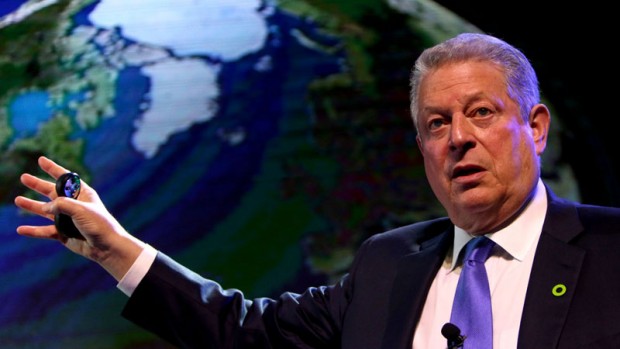Al Gore urges fight vs coal

BOMB DROPPED Former US Vice President Al Gore, an environment advocate, likens the effects of climate change to the
Hiroshima and Nagasaki bombings in his speech before delegates of the Climate Reality Leadership Corps Training. RICHARD A. REYES
FORMER US Vice President and global climate action advocate Al Gore on Wednesday urged the public to act as a “counterweight” to governments and big businesses that continue to use coal-fired plants and other polluting sources of energy.
On the third and final day of the Climate Reality Leadership Corps training in Manila, Gore urged some 750 climate warriors from 33 countries to “summon the political will to be in the streets, knock on doors and organize others to build a counterweight to business.”
He cited the coal lobby as an example of moneyed industry lobbyists who resist the need for a faster and sustained transition to renewable energy sources.
The Philippines still has 25 coal-fired power plant projects at various levels of construction and operation. Only two percent of the country’s energy comes from zero-emission sources such as solar and wind power, and biomass, according to Gore.
“Because of political forces… there must be a counterweight from the people who care,” Gore said at a panel discussion with Philippine officials on climate policy reform Wednesday morning.
Article continues after this advertisement“The system can be made to work if and only if the people in this room decide to make a difference, find ways to connect with one another and use strength in numbers,” he said.
Article continues after this advertisementGore, chair of the Climate Reality Project which trains advocates around the world to spread the moral imperative of action to mitigate climate change, also cited the power of social media and diligent leg work to spur response to the climate crisis.
Gore and his organization provided climate warriors data, including graphs, photos and other materials, which they could use in giving presentations on the present climate reality—thawing glaciers, warming seas, extreme summers, shorter and warmer winters—to encourage a wider response.
Gore cited the example of his home country, the United States, where community organizations were able to muster mass action against the politically influential coal lobby. “Today, coal is dead in the United States as an energy resource, as solar and wind power have taken over each accounting for a third of the energy supply,” he said.
Gore cited the Philippines as a nation that could do more to clear hindrances to effective mitigation efforts, again noting the country’s heavy reliance on coal-fed power plants.
Tony La Viña, dean of the Ateneo School of Government who was the country’s lead negotiator in previous climate change negotiations, called on government to impose a ceiling on the country’s coal reliance, citing the dominance of coal-fired power plants as one such roadblock.
“For me, the first clear policy that government needs to resolve is a cap on coal,” said La Viña, receiving cheers from the audience.
“There should be a new energy mix. We should use a wider range of renewable energy sources,” he said.
Climate Change Commissioner Emmanuel de Guzman said the government is aware, and has taken steps toward reform.
“We are looking at options for addressing these plants, because they’re dirty and they’re the traditional fuel-based power,” De Guzman said.
His commission is conducting a review of laws related to the country’s energy use, with the goal of proposing by June a new legislative reform initiative or an executive order.